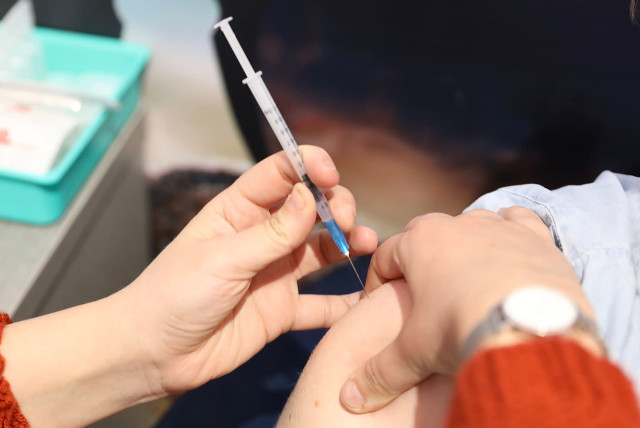 …as experts blame trust deficit
…as experts blame trust deficit
By Chioma Obinna
For decades now, vaccination programmes in Nigeria have been making progress. But the advent of COVID-19 vaccines may be bringing back ugly years of vaccine hesitancy which experts fear may erode gains already made in routine immunisation.
According to experts, vaccine hesitancy is a continuum between vaccine acceptance and refusal.
Eligible Nigerians are either delaying or refusing COVID-19 vaccines, even after the World Health Organisation, WHO, has confirmed the safety and effectiveness against the dreaded virus.
Sunday Vanguard reports that if left unaddressed, vaccine hesitancy will not only threaten COVID-19 response but prevent Nigeria from achieving herd immunity.
Despite the fact that COVID-19 vaccination has accelerated across the country, many Nigerians are still having reservations about the vaccines.
For Emeka Opara, his reservations about being vaccinated against COVID-19 may not change in a hurry.
Like many other Nigerians, Emeka is concerned about the side effects of the AstraZeneca vaccine as reported in some parts of the world even when Nigeria is yet to record any serious side effects since it rolled out.
Unlike Emeka, Juliana Adebayo, a caterer, was ready to accept the vaccine but her aged mother had warned her never to do so.
The mother is among Nigerians who believe that the vaccine is one of the strategies of Anti-Christ to deceive Christians.
“My mother threatened to kill herself should I take the vaccine. She said it is the mark of 666. I also believe that if the vaccine cannot protect me from getting COVID-19, there was no need taking it. These are some of the reservations that I have,” Juliana told Sunday Vanguard.
Meanwhile, Grace Udoh, a banker working in Lagos, initially believed in some of the conspiracy theories but, today, she is open to taking the vaccine after she saw people who took the vaccine had no side effects as reported abroad.
“Initially, I had reservations about the vaccine but after I saw my friends taking it and my doctor explained to me the benefits of vaccines and why I need it to boost my natural immunity, I decided to give it a shot. Now, I have taken my first jab waiting for the second one,” she proudly told Sunday Vanguard.
Today, despite the efforts of the Federal Government agencies and international partners like UNICEF and WHO to create awareness on the benefits of receiving COVID-19 vaccines, millions of Nigerians are still hesitant.
This is no thanks to the conspiracy theories around the pandemic and vaccines.
The myths and falsehood that had been propagated overtime about the aftermath of taking the vaccine had worsened the situation in communities across the country.
From Lagos to the end of the last community in the insurgency inflicted Borno State, the story is the same: Nigerians are still hesitant to the vaccine. Some are yet to believe in the virus talk.
What of the vaccines?
Findings by Sunday Vanguard show that some Nigerians currently opening up for the vaccination are only moved by the intention to own the COVID-19 card to avoid being restricted from international travels in the future.
A visit by Sunday Vanguard to some of the vaccination centers in Lagos confirmed that the numbers of would-be vaccinators are gradually picking up although many residents are still hesitant to the life-saving vaccine.
Experts insist that unless Nigerians open up for vaccination, the country may not achieve herd immunity which the experts say has far reaching implications on the health and economy of Nigeria.
Globally, experts say about 900million persons have received the COVID-19 vaccine.
Although, the level of response and acceptance of the vaccine across the globe has been encouraging, the case is different in Nigeria.
An update released by the National Primary Health Care Development Agency, NPHCDA, on Wednesday, showed that only1, 043, 737 eligible Nigerians have so far been vaccinated with the first dose, representing 51.9 per cent of the proportion vaccinated.
A breakdown of the NPHCDA update, contained in an Electronic Management of Immunisation Data System, further revealed that Lagos is leading in the exercise with 192, 061 persons vaccinated.
Three other states trailing Lagos are Kano 56,942; Kaduna, 55,604 and Ogun, 52,513.
Other states that have recorded 5-digit figures in the exercise are FCT, 44,098; Katsina, 39,297; Bauchi, 35,764; Oyo, 34,755; Ondo, 31,348;
Kwara, 30,708; Jigawa, 27,644; Plateau, 27,334; Edo, 27,129; Gombe, 26,807; Niger, 26,659; Rivers, 26,572; Ekiti, 22, 735; Yobe, 21, 030; Benue, 20,981; Osun, 20,869; Borno, 20,737; Delta, 20,525; Imo, 18,763; Adamawa, 18,612; Nasarawa, 16,860; Kebbi, 15,531; Zamfara, 15,251; Cross River, 14,483; Sokoto, 11,560; Akwa Ibom, 11,350; Enugu, 11,018; Bayelsa, 10, 487.
In the league of 4-digits are Anambra, 9,989; Ebonyi, 8,534; Taraba, 7,538; Abia and Kogi recorded 6,081 and 5,568 respectively.
On the reservations by many Nigerians against the vaccine, experts insist that it is safe.
According to the Communication for Development Specialist, United Nations Children’s Fund, UNICEF, Ms. Elizabeth Onitolo, vaccine is to ensure that while the virus is running its course, people don’t die, hence, the need for everybody to take the vaccine to get the required herd immunity.
To her, refusal of many Nigerians to vaccinate against COVID-19 would prevent Nigeria from achieving herd immunity.
“For Nigeria to get out of the pandemic, everyone must be involved,” she insisted.
Onitolo, who spoke during a three-day Media Dialogue on Routine Immunisation, Post-Polio Certification and COVID-19 Vaccination, explained that of the three main types of COVID-19 vaccines in phase three clinical trials, viral vector vaccines produce coronavirus proteins to safely generate an immune response that cannot give COVID-19.
Throwing light on vaccines, she said RNA and DNA vaccines prompt human bodies to recognise and protect them from the virus that causes COVID-19.
Noting that there are currently more than 200 vaccine candidates (56 in clinical and 166 in pre-clinical development) under development, Onitolo stated that getting vaccinated was one of the many steps people can take to protect themselves and others from COVID-19.
According to her, stopping a pandemic requires using all the tools available.
“Vaccines work with your immune system so your body will be ready to fight the virus if you are exposed. Masks, hand wash and social distancing help reduce your chance of being exposed to the virus or spreading it to others. Together the two offer the best protection”, the UNICEF official said.
READ ALSO: COVID-19 vaccines: COVAX delivers 38m doses in 6 continents – WHO
She added that widespread use of vaccine can reduce rate of spread in the community and reduce chances of a new variant as well as reduce the chances of lockdown.
Corroborating her views in a chat with Sunday Vanguard, a renowned Medical Laboratory Scientist, Dr Casmier Ifeanyi, said despite the fact that Nigeria has vaccinated about one million persons, there is worrisome vaccine apathy in the country, adding that “it is a big challenge with far reaching implications.”
He blamed vaccine hesitancy on factors including trust deficit and alleged want of transparency in the COVID-19 response activity by government at all levels.
Ifeanyi said: “Some states including the Federal Capital Territory reportedly expended billions of Naira that didn’t impact very much on the ordinary citizens during the first wave of COVID-19 pandemic last year.
“So, when the vaccine became available, many people, except the traveling elites and members of the front line healthcare workers, were not eager to take the vaccine.”
Acknowledging that Nigeria does not have enough of the vaccine, he, nonetheless, said the country cannot afford to overlook vaccine apathy by Nigerians.
“Most states in Nigeria including Kogi have received allocations of the COVID-19 vaccine with varying responses but overall people are not enthusiastic about taking the vaccine”, the expert stated.
He pointed out that the implication of vaccine apathy in a globalised world on health and the economy for Nigeria would be very upsetting.
“At the moment, there is concourse by many countries and regional blocs to deploy and implement the vaccine visa and this will negatively impact non-compliance persons and countries”, Ifeanyi pointed out.
“Non-compliant persons and countries may not be able to engage in international travels for trade and other sundry endeavours.”
He warned that Nigerians continued attitude of apathy to the COVID-19 vaccine would do the country harm to the tune of becoming ostracized from the global economic interplay.
According to him, government and Nigerians need to do whatever that is required to ensure that the country is not ostracized.
To forestall the negative implications of non-compliance, Ifeanyi called for a sustained aggressive constructive engagement with the citizenry.
To appraise the enormity of the existing apathy, he said: “Visit any market in Nigeria and you would be shocked by the responses given by members of the public regarding their acceptance or otherwise of the COVID-19 vaccine.
“It’s unfortunate that the general public seems not interested in taking the COVID-19 vaccine. Most Nigerians do not think they have need for the vaccine. A good number of them would even tell you that they rather have need for food vaccine instead.
“In the light of that, government, especially those charged with the COVID-19 response activities, must find ways of incentivizing the campaign for the vaccination.
“We must find a way of making it appeal to our people, we may not need to be draconian in approach but we can find avenues to give incentives, we can also find programs that we would use to motivate people to embrace the COVID-19 vaccine.
“The world is gradually returning to normalcy and it is expected that when a significant number of the global population is vaccinated, herd immunity would have been established.
“So, if vaccination becomes a prerequisite for you to travel, for you to move from country to country then Nigerians must be up to par.”
He stressed the need for more public education and enlightenment on the benefits or the advantages of being vaccinated to get Nigerians interested.
“People should be told the truth about the COVID-19 vaccine so that they know that if you take the jab there are benefits”, the expert said.
“Individuals must be convinced of what they benefit and what the community, country and the world at large stand to benefit through a holistic compliance with the vaccine regime.”
Noting that people are raising concerns that with just 4million doses of the vaccine, those that have received the first jab (sensitisation) may not be able to access the second booster jab in record time due to availability challenges, Ifeanyi urged the Nigerian government to avert stock out of the vaccine so that the overall objective is not aborted.
“Besides, the raging controversies such as the reported blood clot and death cases associated with the Oxford AstraZeneca vaccine and should the World Health Organisation for any reason halt the use of the Oxford AstraZeneca vaccine make it imperative for the country to think ahead for alternatives”, he said.
“Even without it being halted, it is important that the country begins to explore other alternatives such as acquiring the Johnson and Johnson type.
“The provision made in the 2021 Appropriation Act can be accessed to cater for the procurement of the suggested type to afford more Nigerians the opportunity to be vaccinated.
“I’m persuaded that the Executive Director of NPHCDA, the Honorable Minister of Health and the Chairman of the transitioned COVID-19 committee will help to ensure that they amply make available the COVID-19 vaccines for Nigerians”.
Vanguard News Nigeria
The post Vaccine apathy threatens COVID-19 response appeared first on Vanguard News.










![[Video] Speaking In Tongues - Oyereyi](https://1.bp.blogspot.com/-_AsYnQoWjCs/YTy9dQfbceI/AAAAAAAAQyM/bUPsq9lMM_UHqmspyN2qCp4x5hAc2iUywCLcBGAsYHQ/w680/Screenshot_20210911-152304%257E2.png)






Advertise your business here at cheap rate and get large audience to your market. Call/Msg Teemikemedia: 07060733664 to get started.